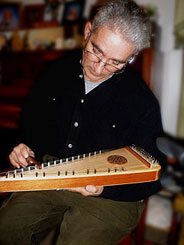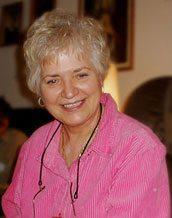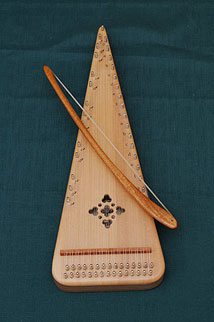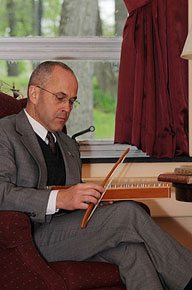
Next year will be the 40th anniversary of Woodstock. It was an event that marked our country and its influence is felt over four decades later with noise some call music that is piped into almost every public place in America.
I got an unexpected reprieve from this musical insanity recently when I entered a home in Paducah, Kentucky and heard Mike Vessels playing a bowed psaltery. Although I was there to present a talk on the apparitions of our Lady of Fatima I was captivated by this peculiar instrument.
It sounded like a high pitched harp and, as the unfamiliar yet harmonious notes wafted through the air, my soul breathed a sigh of relief.
My first question was: “What is it?”
Mr. Vessels took noticeable pride in nonchalantly pointing out that “it is an instrument that was played by King David.”
A collective “wow” was the response of the fascinated audience. It’s not every day you see a biblical instrument, especially in the backwoods of Western Kentucky.
It was another one of those Only in America paradoxes. Forty years after a culture-changing event like Woodstock you find people in the countryside of Kentucky who are attracted to the pleasant melodies produced by a centuries-old instrument.
* * *
Paducah is a place where stock car racing is still done on dirt tracks and people pay a hefty price to see it. Located a short distance from the idyllic “Land Between the Lakes,” it is also an outdoorsman’s paradise. A place where men pride themselves in their ability to do everything a man needs to do to survive. A more striking example of rural America would be hard to find.
Musician from Duck Creek RV Park
Mike Vessels is a retired instrument mechanic at the local power plant in Paducah and now owns the Duck Creek RV Park outside of town. He possesses large amounts of the good-ole-boy Southern hospitality so common in the area.He used to play the piano but after being diagnosed with Multiple sclerosis and maiming his hand in a work-related accident, playing the melody was almost impossible.
“So I was stuck without [an instrument] for about 30 years,” he said, “until this came along.” He first saw a psaltery being played by a visitor to his RV Park.
“Upon hearing it for the first time I knew I had to get one,” he said. The interest among fellow Kentuckians in the psaltery was such that he started selling them shortly after purchasing his own.

Patricia Dowd is a native of Pittsburgh, Penn and has lived in Kentucky for the last 17 years – long enough to adopt the easy way and sweet charm of the natives. As Mr. Vessels played his psaltery, she watched with child-like attraction and wonder.
“It is very soothing and relaxing,” she said. She was not surprised however at the attraction for the psaltery in Kentucky.
“I can understand it, because of the [type of] instruments they play down here. They’re music people” she said. “That’s Kentucky.”
The psaltery had the same kind of power over me and although my musical ability is limited to the “on” button of my iPod, I was delighted to find myself playing the first notes of Joy to the World with utter ease. I too was sold.
After Mr. Vessels decided to get a psaltery, finding the right one proved difficult. After researching the Internet, he found a variety of different psalteries but was always dissatisfied. They were either too bulky, heavy or didn’t have a good sound.
“I happened to just luck on the right kind,” he said referring to his present instrument.
Unicorn Strings
Those are the ones produced by Unicorn Strings1 in Brooker, Florida. It was founded over twenty five years ago by Gene Jaeger.
Mr. Jaeger was formerly a construction worker capable of building anything from houses to sail boats. His first exposure to ancient instruments came while visiting a yard sale where David Beede was sitting on the front porch playing a hammered dulcimer.
Mr. Beede, formerly a counselor for the criminally insane, had been a musician his whole life but started making instruments in order to pay his way through school and free himself from a stressful job. He actually made the dulcimer he was playing that day in an old shed behind his house. Gene Jaeger noticed this shed needed some repair and made an offer which the “yard sale musician” could not refuse.
“I will work on your shed,” he said, “If you show me how to make an instrument.” Mr. Beede had formally been in the market of custom-made instruments. “At most I would build a handful [of instruments],” he said, “or a pair of dulcimers, whereas Gene envisioned setting up a system and producing hundreds of instruments.”
Thus was formed a friendship and a lucrative partnership which lasted for eight years. In the beginning, they made a variety of different instruments before gravitating towards the psaltery because it was an instrument “which moved people the most.”

Soothing Music in a Stressful World
Jessica Jaeger, another music lover and Gene’s wife clarified its origins for me.
“The instrument which King David of the Old Testament played to ease the headache of Saul,” she explained, “would have been an instrument where the strings go parallel to the soundboard.” Although the current version of the instrument dates back to the Renaissance period they are equally effective in easing the headache one gets from exposure to modern music.
Not surprisingly Mr. Jaeger finds the best reception for his instrument at Renaissance festivals where he shows up wearing a merchant’s costume from the 1500’s.
The reason Americans buy psalteries, according the Mr. Jaeger is very consistent. When they first hear it, they say: “That is so soothing and relaxing.”
In the stress-filled world of today it is no wonder that people gravitate towards such an instrument.
“What I am wondering,” Mr. Jaeger asked, “is why do they have this tension which the music relaxes? I don’t have it and I think it is because I play music.” The music he plays however is radically different from what one commonly hears these days. It is almost impossible to find a public place anymore, especially restaurants, where you are not assaulted by loud and offensive music.
Not even in Home Depot is one safe. When going there to purchase building supplies, Mr. Jaeger described “emotional” background music that he found hard to “tune out.”
“It’s really not appropriate to experience such emotions in a lumber yard,” he said. “It makes it hard for me to go into a restaurant,” he continued, “because I have to tune out a different type of noise and wherever you go there is that noise. Most people don’t know that there is something else called music which is still important and valid. This is part of the positive response to the psaltery.”
After speaking with thousands of people in his travels about music, Mr. Jaeger is convinced that there is a “certain core in people where they want to be calm.” He says they are looking for “soothing, pleasant or peaceful music that strikes the right cord.”

Trip to St. Louis
After learning some songs, I had the chance to take my psaltery on a trip to St. Louis. The trip provided an excellent opportunity to see the reaction of the average American in airports.
While waiting for a delayed flight in Chicago O’Hare, I pulled out my psaltery and began playing “Greensleeves.” It was quite amusing to contrast the calm and melodic sound of the psaltery with the agitated ambience in one of the world’s busiest airports. I could not help but notice a perceptible change in the atmosphere as the notes drifted through the air.
It wasn’t long before numerous passengers approached with questions, compliments, and even a request to photograph my “biblical” psaltery. All of them were as shocked as I initially was to find out that I purchased it in Paducah, Kentucky.
Perhaps the most significant reaction to the Psaltery came from Dr. Howard Whitcraft, a Ph.D. in mathematics from St. Louis Missouri. He could not contain his enthusiasm. “It had to be a mathematician that designed it,” he said commenting upon the instrument’s striking simplicity. As he listened to a few songs, he observed how “innocent” it was. This comment captured, what I consider to be, the main reason for the psaltery’s attraction.
Those who participated in Woodstock might have thought that the music they were promoting was innocent and carefree, but it was not. Their music merely appealed to animal side of man and thereby unleashed the disorderly passions of the soul. In that sense, it was a contributing factor to modern man’s search for quiet places and peaceful sounds.
After being continually exposed to a modern music which frays my nerves, I am consoled that I can find repose in a musical instrument originally played by King David but appreciated by Americans throughout the country. It is yet another paradox which I am happy exists only in America.

